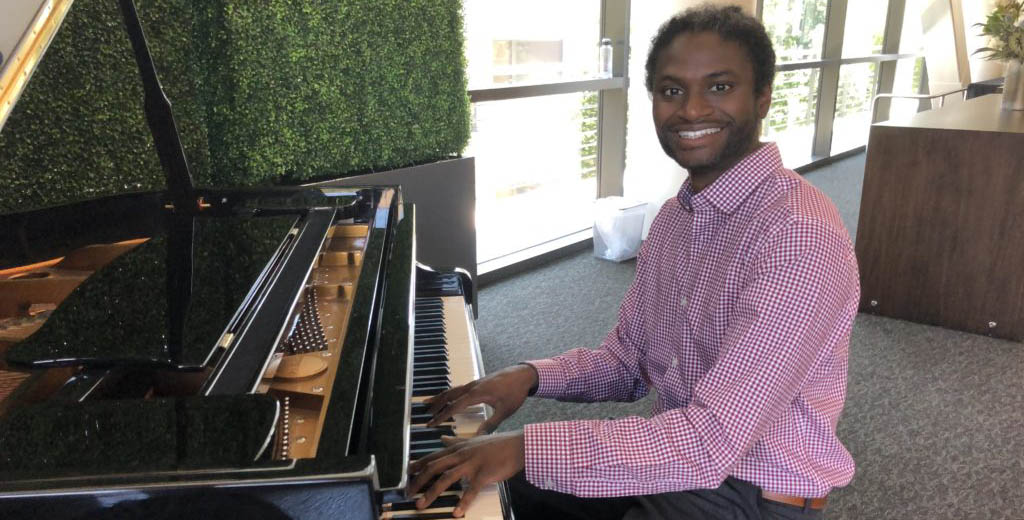The piano on the second floor of the medical school's Li Ka Shing Center for Learning and Knowledge used to be locked. No one could play it without making an appointment. But four years ago, Stanford medical student Sheun Aluko arrived on campus and made it his mission to free the keys.
Aluko, who goes by "Shay," recently completed the medical school curriculum and will enter a master's program within the school of medicine for biomedical informatics. He sat down with me to talk about his plans after medical school and the reason he was determined to get that piano unlocked.
I was born to a Singaporean mother and a Nigerian father. They named me Oluwasheun. In Nigerian, Oluwa means God and Sheun means "give thanks to." When my mother and I moved to the U.S. when I was 4, my name was shortened to just Sheun, just because my full name wouldn't fit in the boxes on the forms, and Sheun was just easier to say. People thought my name was Sean. And my mom has always called me Shay.
In high school, I read this book, The Body Electric: Electromagnetism and the Foundation of Life. It was about biomedical engineering -- things like artificial retinas and the cochlear implant. The idea of using technology to allow someone to hear again or potentially even see again was super fascinating me. I majored in biomedical engineering and then went onto medical school.
I took piano lessons when I was in first grade for a year and I would cry when my parents made me go to practice. I stopped, but then in sixth grade, my sister was playing Pachelbel's Canon. I started playing my own variation, and after that, I played piano for multiple hours every day. Mainly I learned by watching YouTube videos and feeling it out, just messing around and driving my parents crazy.
Anytime I see a piano I haven't seen before, I have a strong urge to play it. There's nothing more frustrating to me than a piano that's locked. It's basically an oxymoron.
When I started here, I told Dean [Charles] Prober that it would significantly improve my quality of life if he unlocked the piano. But the dean's office was on the third floor and they didn't want people to be making a ruckus on the piano. They decided they would unlock it, but they would post a schedule of when you were allowed to play, and there was a man whose job was to update the schedule each week.
Eventually they gave up on the schedule and now it's just unlocked. Later on, I did open mic night events my first and second year, and we used that piano. I'll be walking by sometimes and hearing people play it and it's kind of cool.
I see myself working as a clinician in a hospital setting, and at the same time working on teams to develop software tools for patient care. Because I'm actually using the tools, I'll be better able to develop them. That's something I've found to be true in my hobby life. I develop a lot of software that I use for myself. If I think, "I wish I could do this," I write a program to do that.
One of the things I'm working on right now is voice control software. I can come home and talk about what happened in my day, and I have a program that will save the audio to a database on the cloud.
I also use it now to record my blood pressure and weight. I'll say, "New blood pressure" and the computer will say "What's the systolic?" And then I can print it out and take it the doctor.
I've worked on one main project, creating a device that kids with cerebral palsy would wear on their knee to train them to walk better. I developed all of the algorithms for detecting when the heel hits the ground and toe leaves the ground, and when the knee is maximally flexed. Now all the code I wrote needs to be tested on human walking to see if it works in practice.
Definitely my mom and my stepfather. From a really early age, they fostered my curiosity and really channeled and directed it. My sister, for getting me through the toughest times of medical school. And my girlfriend, who's a general surgery resident at Stanford. We met at the beginning of medical school; we were anatomy partners and we met dissecting cadavers. When I look back at my time at Stanford, meeting her is probably going to be one of the best things that happened.
Listen to Shay play the piano and talk about his life in medical school in this recent interview with Medicine & the Muse coordinator Christy Hartman:
Photo by Daphne Sashin




